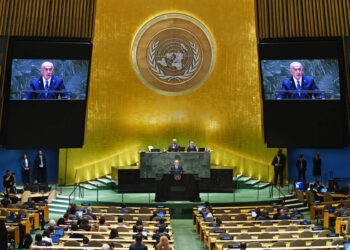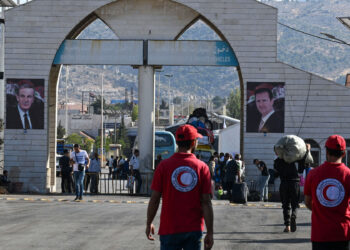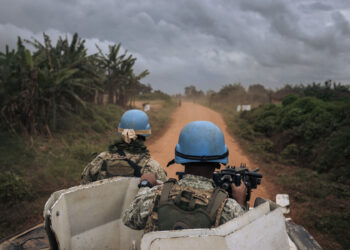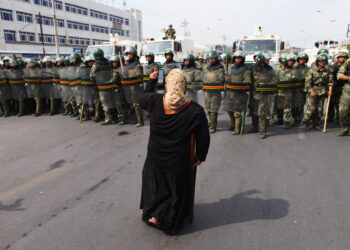Available in العربية
Youssef Al-Sharqawi chose to migrate from the city of Benghazi in eastern Libya to Europe via the sea, after Haftar's gunmen raided his house, burned it completely, and threatened him with death. He also feared that he would be pursued in the Libyan capital, Tripoli.
Youssef chose to be called Al-Sharqawi (meaning from the east), because his origins can be traced back to the eastern cities of Libya. Before the Libyan revolution in 2011, he used to work in a German-Libyan company operating in Libya in the field of construction and reconstruction.
In a conversation with Democracy in the Arab World Now (DAWN), Al-Sharqawi said that his participation in the Libyan revolution in Benghazi was limited to training young people in human development in the Preventive Security Apparatus of the National Transitional Council and the Supreme Security Committee of the Ministry of Interior. Then, he was appointed Financial and Administrative Director for Leaders Preparation Project in the Warriors Affairs Commission before joining the Libyan Organization for Government Administration.
Al-Sharqawi asserts that the city of Benghazi was enjoying a golden period of security, stability and tranquility before Haftar forces arrive the city, noting that some criminals took advantage of the weakness of the security services to carry out assassinations against officers, officials, activists, sheikhs, and actors in the city.
Before leaving Benghazi, Al-Sharqawi tried to meet with a large number of local leaders in order to form a security body that would defend the interests of the citizens in Benghazi and to be the resort of citizens and foreigners for any problem and in coordination with the Benghazi Municipal Council.
When the death threats increased, Al-Sharqawi left his city, saying that leaving home, family and friends in Benghazi was not a simple decision for him, as he went out with his six children and his wife at night after Haftar's forces extended their presence in the city, with increased assassinations of officers and leaders and disappearance of symbol leaders of the February 17 Revolution.
Al-Sharqawi traveled from Benghazi to Misrata in western Libya and settled there for months and formed a crisis committee with displaced Benghazi young people, who left Benghazi after the increase in Haftar's influence in the eastern cities. Also, he and some journalists held the National Day for Freedom of the Press and Information for two consecutive years.
Al-Sharqawi states that his appearance on media on World Press Freedom Day caused him to be threatened again with death by Haftar's gunmen in Benghazi over the phone, despite his departure from Benghazi and his presence in Misrata.
After months, he moved to Tripoli which experienced kidnappings of prominent leaders. One day, Al-Sharqawi received a direct threat from an armed group leader, Haitham al-Tajouri.
"My parents and brothers were not able to answer my calls for their fear of Haftar's criminality in Benghazi. My relationship with my family in Benghazi was cut off, and things became too complicated for me. I was tired of traveling around with my wife and children, and many cities are no longer as safe as they were. Every day I feel that danger is approaching me and my children," al-Sharqawi stated.
My Journey to Europe
"I decided to leave the country. I took the irreversible decision of immigration and left my country because I said no to Haftar. I tried to leave in an official way from Libya, but because there were no embassies to issue me a European visa, my only option was to ride to the sea with my wife and children despite dangerous journey," Al-Sharqawi added.
Al-Sharqawi spoke with friends who emigrated via the sea. These friends connected him to a human trafficking leader in the city of Sabratha to transport his family from Tripoli to Sabratha, in which he stayed for days with three other families before the smuggler informed them that the journey's time would be at noon. He then saw a motorboat and another boat for protection.
"We were three families. We paid an exorbitant sum to the smuggler in order to go on a big motorboat and another for protection," Al-Sharqawi said. "Nevertheless, we were afraid. After three hours we arrived at the Italian battleship in the Mediterranean, in which we stayed for three days. The battleship had many immigrants and they provided us with food and drink, then they took us to a camp in Italy," he added.
Al-Sharqawi explained that his goal was to go to Germany or Norway and not to stay in Italy. The Italians wanted to take his fingerprint in Italy, but he refused and left the camp with his family and the family of his friend, traveling from one country to another on a tiring journey.
Al-Sharqawi went out with a smuggler from northern Italy to France where he stayed in a hotel with very expensive prices because it deals with people who have no official papers. In the next day, he took the train to Germany.
I Arrived to Safety
"I arrived in Germany with my family, and we became safe. Some friends advised me to go to Hamburg. When I arrived Hamburg, they brought me back to the state of Saxony, and then I moved to Chemnitz, the main city for immigrants. We stayed there until they gave us identification papers to be able to move. Then, I did the interview with a German judge, and we were transferred to a governmental residence in Leipzig, one of the major cities in eastern Germany," Al-Sharqawi said.
"My wife and I study German. My children are also doing even better than German themselves in school. Now, I work and live in a house in peace and stability. They registered me with a family doctor and a pediatrician for the children. After about four months, I received the asylum residence permit. The Germans gave me what the people of my country could not give me in Libya. But if I have the guarantees to return home with no risk, I would return to my country," he added.
"We did not face any problem in Germany. They gave us clean housing and provided us with meals. The government took care of us and gave us money for clothes for the first time. We have free education and medical treatment, and we have a monthly salary that provides you with a good life. The state institutions are supporting us unless we violate the law," he explained.
Al-Sharqawi pointed out that his story may be different from other immigrants who, for various reasons, have not yet received their residence permit in Germany, but in general everyone has arrived to a place where they can live in safety and security.
***
Photo: SALLUM, EGYPT – MARCH 17: Rohan Muhammed waits in her car with luggage on the roof after her and her family cleared customs to enter Egypt at the Libyan/Egyptian border crossing on March 17, 2011 in Sallum, Egypt. The family left their home in Benghazi, Libya because of the fighting that is nearing that area. Opposition forces have been losing ground as government troops loyal to Libyan leader Muammar Gaddafi press a counter-offensive to the east. (Photo by Joe Raedle/Getty Images)







